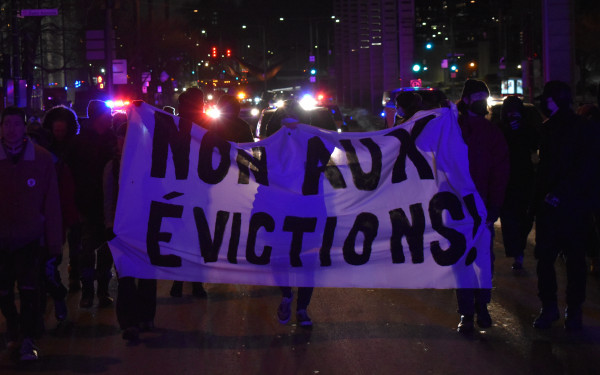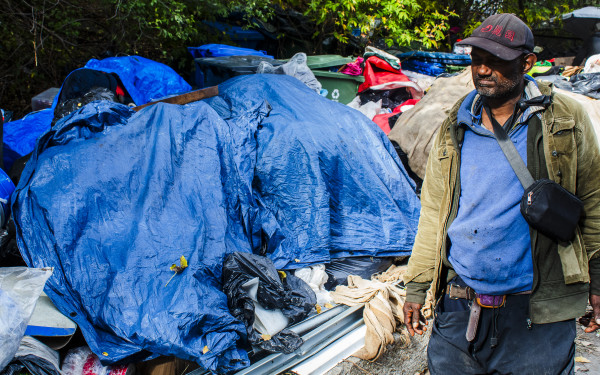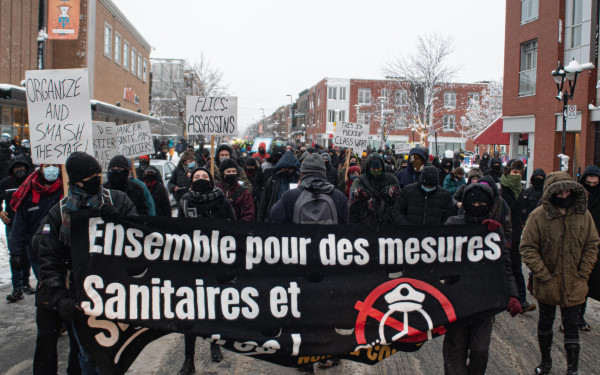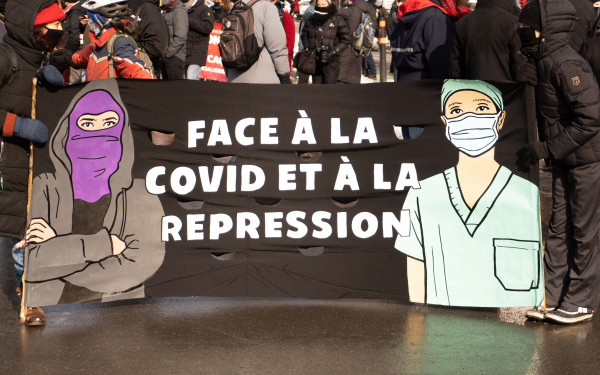Solidarity With The Ville-Marie Survival Camp
Le Frigo Vert Prepares Packages For Unhoused Montrealers
As Montreal’s frigid winter weather is on the horizon, Le Frigo Vert and Rising From Our Roots, are hoping to lend a helping hand.
As part of its anti-colonial week 2022, Le Frigo Vert, a student-owned community space, hosted a Community Solidarity Fundraising Day on Dec. 2. The event’s purpose was to educate, build community and take action against ongoing colonialism.
Attendees could volunteer, share a hot meal, learn about issues facing Indigenous peoples and help package donations for unhoused people in Montreal.
Packages for the Ville-Marie survival camp
The donations collected went to the “survival camp” set up by unhoused people under the Ville-Marie bridge. According to Atreyu Lewis, the founder of Rising from our Roots, the camp is primarily made up of Indigenous people and is facing eviction threats by the Montreal police.
But, as Donald, an organizer with Le Frigo Vert, pointed out, “[unhoused people] are told to leave—told that [the police] want to close it down and for them to go somewhere else. But, there is nowhere else.”
According to Hunter Cubitt-Cooke, another organizer with Le Frigo Vert, there are about 50 people living under the Ville-Marie Bridge, and the group aimed to put together 50 packages. They exceeded this number and were able to collect enough donations to put together almost 100 packages. Extra packages will be sent to Resilience Montreal, a non-profit day shelter.
The packages included everyday essentials such as toothbrushes, toothpaste, menstrual products, wet wipes and hand warmers. Le Frigo Vert also collected other items to help survival camp members stay warm, including winter jackets, blankets and tents.
“I would like for people to see these people as community members, as our neighbours, not just statistics,” Lewis said. “The care packages are one way of letting them know that we’re actively thinking about them.”
Warmth is needed for unhoused folks in Montreal
When it comes to Montreal’s extremely cold winters, “people die each year,” Cubbitt-Cooke told The Link. Le Frigo Vert organizers explained that “the city does not do much to help unhoused people have somewhere warm to stay.” This past winter, multiple unhoused people were reported dead from extremely cold temperatures, which occurred due to lack of adequate housing.
“They just tell you to go to a shelter, but all the shelters are filled,” Lewis said. “It’s very difficult, so [unhoused folks] create encampment sites in different areas.”
Cubbitt-Cooke added that unhoused people are welcome to come into Le Frigo Vert to warm up, use the bathroom, and get hot water.
The impacts of ongoing colonialism
When asked about what circumstances led to shelters filling up and the formation of survival camps, Cubbitt-Cooke said multiple factors were to blame. “It’s everything hitting together: the housing crisis, no mental health services—it’s a trauma soup we’re all living in.”
“You know, there’s a myth that goes around,” Donald said. “Affluent people think people choose to be homeless or choose to live in a tent. Circumstances make that happen. People don’t choose to live without hot water and heat. It’s the price of rent and price of food that keeps going up. And social services can’t keep up with demand.”
Lewis added, “A huge population of unhoused persons are Indigenous, and a lot of them are sixties scoop survivors—they don’t have that generational support.” The sixties scoop refers to the removal of Indigenous children from their families into white foster homes by the government in the 1960s.
The disproportionate rate of houselessness amongst Indigenous people is because of ongoing colonialism, Lewis said. They explained that “a lot of Indigenous peoples in cities don’t feel a sense of community.”
“That's why the tent cities offer community. They look out for each other. They’ve got strength in numbers.” Cubbitt-Cooke added.
For Le Frigo Vert and Rising from Our Roots, solidarity conquers charity because the fight for decent housing needs to be an ongoing effort centred on decolonization.
This article originally appeared in Volume 43, Issue 8, published December 6, 2022.

_900_600_90.jpg)





